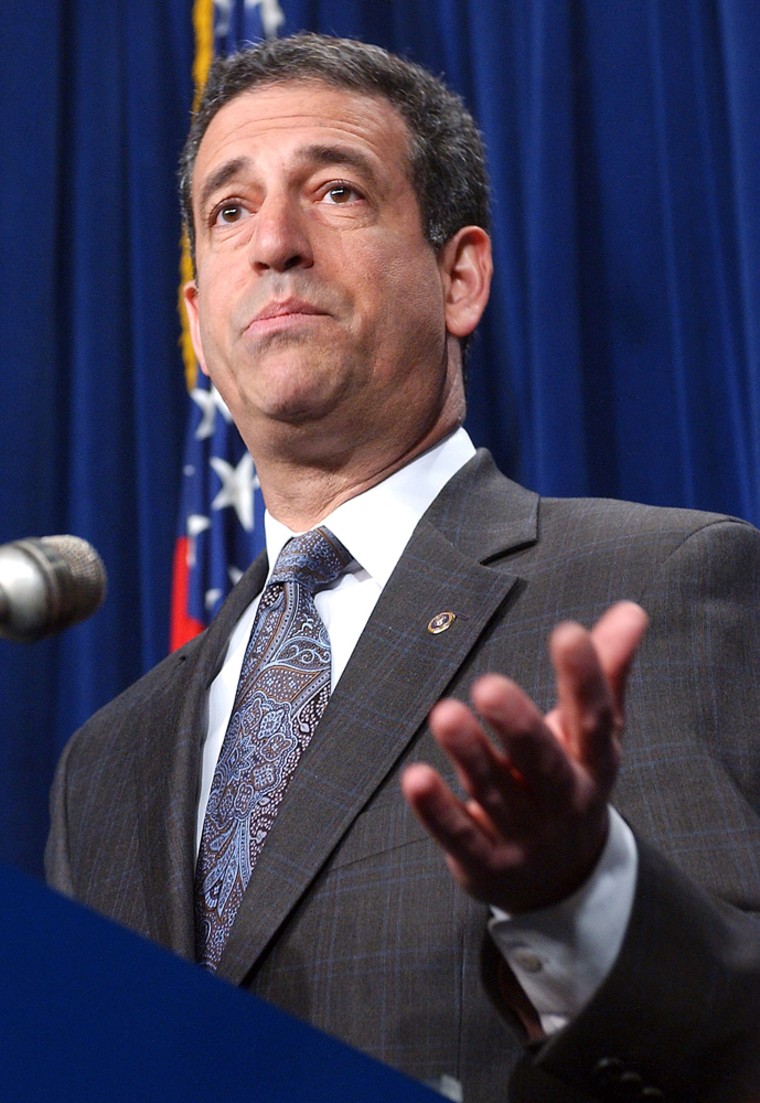As Sen. Russ Feingold urges the Senate to censure President Bush, the alleged misdeed that moved the Wisconsin Democrat to propose censure continues: The Bush administration keeps conducting surveillance of calls by suspected al-Qaida operatives to and from people in the U.S.
Feingold had to leave early from Tuesday's Senate Judiciary Committee hearing on how to legalize the National Security Agency surveillance program — he had an appointment at the White House to meet with the man he wants to censure.
Just back from Iraq, Feingold was part of a group of senators who went to discuss their findings with President Bush.
Would this meeting be awkward?
“No,” Feingold said as he hustled down a Senate hallway on his way to the White House. “The president and I and others who’ve been involved in government for a while know that each issue is different. And we have an obligation to each other and the country to treat each issue differently.”
He added, “I appreciate the president’s interest in the findings from the trip this weekend. In my mind, it won’t be awkward. I respect the president, I respect him personally and I respect his office.”
Meanwhile back at the Judiciary Committee, Chairman Sen. Arlen Specter, R-Pa., has scheduled a Friday hearing on the censure proposal.
Specter opposes censure, as does Judiciary Committee Democrat Sen. Joe Biden of Delaware, who said at Tuesday’s hearing, with exasperation in his voice, “The idea of censuring the president — we don’t know what he did.”
The politics of a censure vote
Friday’s censure hearing sets up what both Feingold and Senate Majority leader Bill Frist want: a roll call vote on the Senate floor on censuring Bush.
This would force all 100 senators — and especially the potential Democratic presidential hopefuls — Sens. Biden, Evan Bayh, John Kerry and Hillary Clinton — to go in the spotlight and make their choice: either condemn Bush for taking an action which the president argues is necessary to defend the nation from al Qaida attacks — or give Feingold a potential weapon to use against them in the event that he too seeks the Democratic presidential nomination.
A “no” vote on censure would also incur the wrath of Democratic groups such as Moveon.org.
Even as he moves ahead on a censure showdown, Specter is also pressing forward on the bill he has drafted to put the NSA surveillance under the scrutiny of a special court established by the 1978 Foreign Intelligence Surveillance Act (FISA).
Under Specter’s proposal, if, after finding out more about the program, the FISA court determined it was constitutional, then it could continue.
“I’m going to bring it up as the priority item when we come back after the Easter break,” Specter said.
He said he’d conferred with Attorney General Alberto Gonzales and White House Counsel Harriet Miers on his bill. They see no need for it.
“Their position is that the president has inherent authority (to order the surveillance) and that’s that,” he said. Gonzales and Miers cite Bush’s authority as commander-in-chief under Article II of the Constitution.
“They have an argument under Article II,” Specter observed. “They don’t really have an argument under the (2001 use of) force resolution.”
Constitutional authority in question
Specter’s view is that Bush has violated the 1978 FISA law by ordering the surveillance program but he adds, “It may well be that the program is within the president’s inherent (constitutional) authority. But it seems to me that determination has to be made in accordance with tradition by a court, by judicial review.”
Five federal judges came before Specter’s committee Tuesday to lend their expertise. They have experience overseeing spying under the FISA law, which usually regulates surveillance of foreign agents inside the United States.
Each judge said he supported Specter’s bill, although some suggested tweaks to it.
Another witness, New York attorney David Kris, who served as one of the top national security lawyers in the Justice Department from 2000 to 2003, told Specter’s committee Tuesday: “I see this as a constitutional moment. I see it as a clash between the expressed will of Congress and the actions of the president.”
Kris emphasized that he knew nothing about the operations of the NSA program and could only offer general comments based on what has been made public so far. He concurred with Specter that the program violated the FISA law.
While Specter pushes his solution, another option — Congress ending the NSA program by using its fiscal power — is languishing for now.
When Feingold was asked two weeks ago whether he would take action against the NSA program by cutting off funding for it, he replied, "Cutting off funding? How are you going to enforce that? If the president has inherent power, he'll just shift some money around. He'll just keep doing it. That's the problem with this doctrine. If the president isn't going to acknowledge that a law we passed such as FISA binds him, why should the cutting off of funding affect him?”
Hinting at the 2008 election, Feingold said, “An administration that is incompetent, that is dishonest, and doesn’t respect the law, basically means that we should have a different kind of administration in the future.”
Two weeks ago, Rep. Jay Inslee, D-Wash., was planning to offer an amendment to a military/hurricane Katrina spending bill to cut off funding for any surveillance program that doesn’t comply with FISA.
But Inslee decided to wait until the House takes up another bill, the defense appropriations bill, after the April recess.
That, like the vote on Feingold’s censure idea, will be a chance for members to go on the record.
